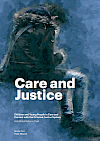26th February 2019
 The Irish Penal Reform Trust launched an independently commissioned exploratory research study on the connections between care and justice in Ireland on Tuesday 26th February 2019. Care and Justice: Children and Young People in Care and Contact with the Criminal Justice System was supported by a Private Donor Fund at the Community Foundation for Ireland.
The Irish Penal Reform Trust launched an independently commissioned exploratory research study on the connections between care and justice in Ireland on Tuesday 26th February 2019. Care and Justice: Children and Young People in Care and Contact with the Criminal Justice System was supported by a Private Donor Fund at the Community Foundation for Ireland.
Research evidence from several countries shows that children with care experience are over-represented in the criminal justice system but, to date, no research has been conducted on this topic in the Irish context. This report aimed to explore the extent to which children with care experience are over-represented in the Irish youth justice system. The report was authored by Dr Nicola Carr (University of Nottingham) and Dr Paula Mayock (Trinity College).
The report highlights that contact with the youth justice system is a particular issue for a small cohort of young people. The association between care and justice is an area of concern, particularly at the ‘higher end’ of the youth justice system, that is, when children are prosecuted in the courts and are placed in detention. This is identified as an issue for children with multiple and complex needs, many of whom are accommodated within residential care.
Systemic factors including the profile of care provision, the prosecution of children in care placements and the responsiveness of the youth justice system to children in care are explored.
This report identifies a lack of data in Ireland on the extent to which children in care come into contact with the criminal justice system. There is a lack of a coordinated policy between Tusla, care providers and An Garda Síochána in this area and the development of such a policy is recommended. The report also focuses on the transition of children from care into leaving care and aftercare and the lack of information on outcomes for this group.
The need for reform is outlined in 12 recommendations made in the report. These include:
To read the report in full, click here.
To read a summary of the recommendations, click here.
Supported by a Private Donor Fund at the Community Foundation for Ireland.





Respect for rights in the penal system with prison as a last resort.